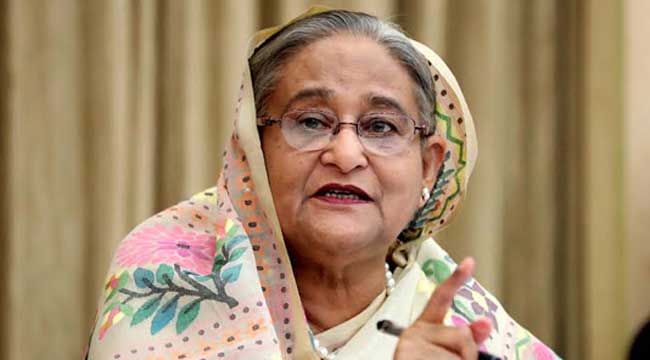After governing the country for 15 and a half years, Sheikh Hasina was forced to step down, labeled as a ‘dictator.’ The primary reasons attributed to her downfall in the face of student and public protests include stubbornness, arrogance, and overconfidence.
Under Sheikh Hasina’s autocratic rule, her government became completely detached from the populace. By alienating the Western world, she found herself geopolitically isolated towards the end. Ultimately, public protests forced her to leave the country. Her resignation and departure occurred within a few hours yesterday, Monday.
Sheikh Hasina, the president of the Awami League, resigned from her position as Prime Minister before noon yesterday. Multiple government sources indicate that she intended to address the nation before resigning but was not given the opportunity or time. Before noon, she went to Bangabhaban and tendered her resignation to President Md. Shahabuddin. Around 2:30 PM, she left Bangladesh for India from Bangabhaban in a military helicopter, accompanied by her younger sister, Sheikh Rehana.
Firm Stance, Eventual Resignation
Despite the student movement for quota reform in government jobs, which began 36 days ago, transforming into a campaign to overthrow the government, Sheikh Hasina’s administration maintained a firm stance. Even on Sunday, attempts were made to counter the movement by deploying the Awami League, Chhatra League, Jubo League, and other allied organizations. However, this resulted in nearly 100 deaths across the country due to clashes. Yet, the administration continued to discuss suppressing the movement with a firm hand.
From Sunday evening until late at night, Sheikh Hasina held multiple meetings with a few close ministers and officials at Ganabhaban. Several close leaders of Sheikh Hasina noted that pressure on the government continued to increase on Sunday. Despite believing they could control the situation, the pressure kept mounting. By yesterday morning, they realized their time was up, and Sheikh Hasina had to decide to relinquish power.
Reasons for the Situation
When students were peacefully protesting, on July 14, Sheikh Hasina belittled their legitimate demands during a press conference, even using the term ‘Rajakar’ (traitor) to address the students. This showcased her stubbornness and arrogance, incensing the students and intensifying the movement. When the government used law enforcement to suppress the movement, over 200 people died across the country from July 17 onwards. Despite deploying the army and imposing curfews, the situation couldn’t be controlled. Eventually, the students took to the streets with a single demand for the government’s downfall. The massive loss of life ultimately led to the collapse of the government.
Isolation of Hasina’s Government
Within the country, the Awami League became isolated. During her long tenure, Sheikh Hasina antagonized many. Corruption at various levels of her government, money laundering, and economic downturns created public discontent. Politically, except for the 14-party alliance led by the Awami League, all other parties took an anti-government stance. This left Sheikh Hasina politically isolated, which was evident during the student movement.
In terms of geopolitics, Sheikh Hasina’s government relied heavily on India, surviving three controversial elections. The government also maintained relations with China, with Sheikh Hasina visiting China from July 7 for two days, although the visit did not yield good results. Relations with the United States had been strained for a long time, with frequent criticism from Sheikh Hasina and her leaders. The relationship further deteriorated around the 12th national election held on January 7.
Ultimately, Sheikh Hasina and the Awami League made adversaries of the people and students, leaving them completely isolated.
Sheikh Hasina has now left the country. Some leaders within the Awami League believe that by leaving the country, Sheikh Hasina has destroyed her long-standing political achievements and jeopardized the existence of the Awami League, the party that led the Liberation War.
- Kadir Kallol,
